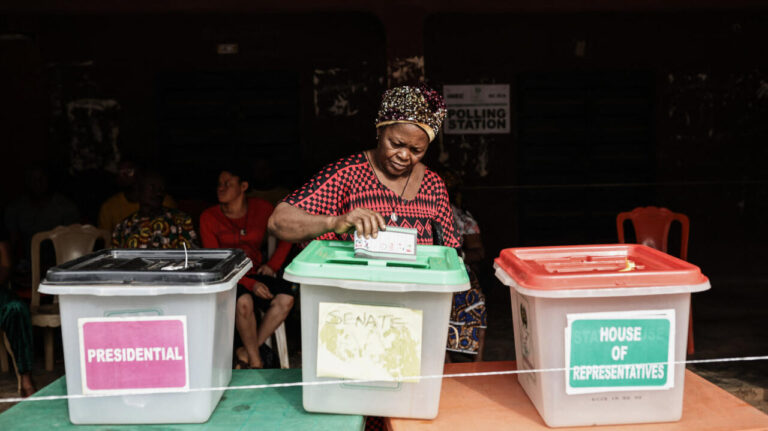Issued on:
Vote counting started in Nigeria’s tightly contested election on Saturday, with three frontrunners vying to govern Africa’s most populous democracy after a ballot hit by delays and isolated violence.
Among the candidates in the race, three stand out: Bola Ahmed Tinubu, candidate of the ruling party (APC), Atiku Abubakar of the main opposition party (PDP), and Peter Obi, backed by the Labour Party.
Crowds gathered to watch counting in some polling centres, where officials were observed by party representatives. Tallies were counted by hand before they were sent on electronically.
“We have to stay and watch,” said Chinoso Ekpei, 27, a contractor, waiting with a crowd of dozens for the tally at their polling station in Ikoyi, Lagos. “We have to focus, we don’t know what they did last time.”
PDP’s candidate Abubakar claimed fraud when he was beaten by Buhari in the 2019 vote before the Supreme Court dismissed his lawsuit.
Independent National Electoral Commission (INEC) said vote counting started where the voting had ended but has not said when official results will be released.
Thugs disrupted polling at some voting stations, but the election was mostly peaceful in a country where attacks and ethnic tensions marred past votes.
But angry voters protested after INEC started late or problems with identification technology disrupted voting in several centres in Lagos, southern Port Harcourt and the northwest state of Kano.
“INEC didn’t arrive on time and they’re not organised. I want to vote. We are tired, we need change,” said Chikezae Okafor, 41, a health and safety officer in Port Harcourt.
Voting was scheduled to end at 1330 GMT though INEC Chairman Mahmood Yakubu said people in lines after could still cast their ballots.
In southeast Anambra State, officials counted votes at Nnamdi Azikiwe University, where crowds of voters danced and sang.
But desperation was clear in another nearby centre.
“It is not normal. I will wait all night, I came to vote and I will,” said student Blessing Mbanefo, 21, waiting to vote. “I’m ready to sleep here.”
Streets in Lagos and other cities were mostly calm on Saturday, as traffic was restricted. Groups of boys took advantage to hold impromptu football matches in the empty roads.
Several Lagos polling booths were ransacked, according to INEC, and voting at 141 polling units in Bayelsa would take place on Sunday after the ballot was disrupted there.
Cash shortages
Fuel and cash shortages caused by a bank note exchange in the run-up to the election also left many Nigerians struggling more than usual in a country already hit by more than 20-percent inflation.
Voters will also cast their ballot for Nigeria’s two houses of parliament, the National Assembly and Senate.
To win the presidency, a candidate must get the most votes, but also win 25 percent in two-thirds of Nigeria’s 36 states.
If no candidate wins, a runoff will take place within 21 days between two frontrunners — an unprecedented outcome that some analysts say is a possibility this time around.
Most experts said INEC was more prepared than in 2019 with the biometric voter IDs to help prevent fraud and results transmitted electronically.
But Nigeria’s security challenges are vast.
Jihadists operate mostly in the northeast, bandit militias carry out mass kidnappings in rural communities in the northwest, and separatist gunmen are accused of targeting INEC offices and police in the southeast.
(FRANCE 24 with AFP)



